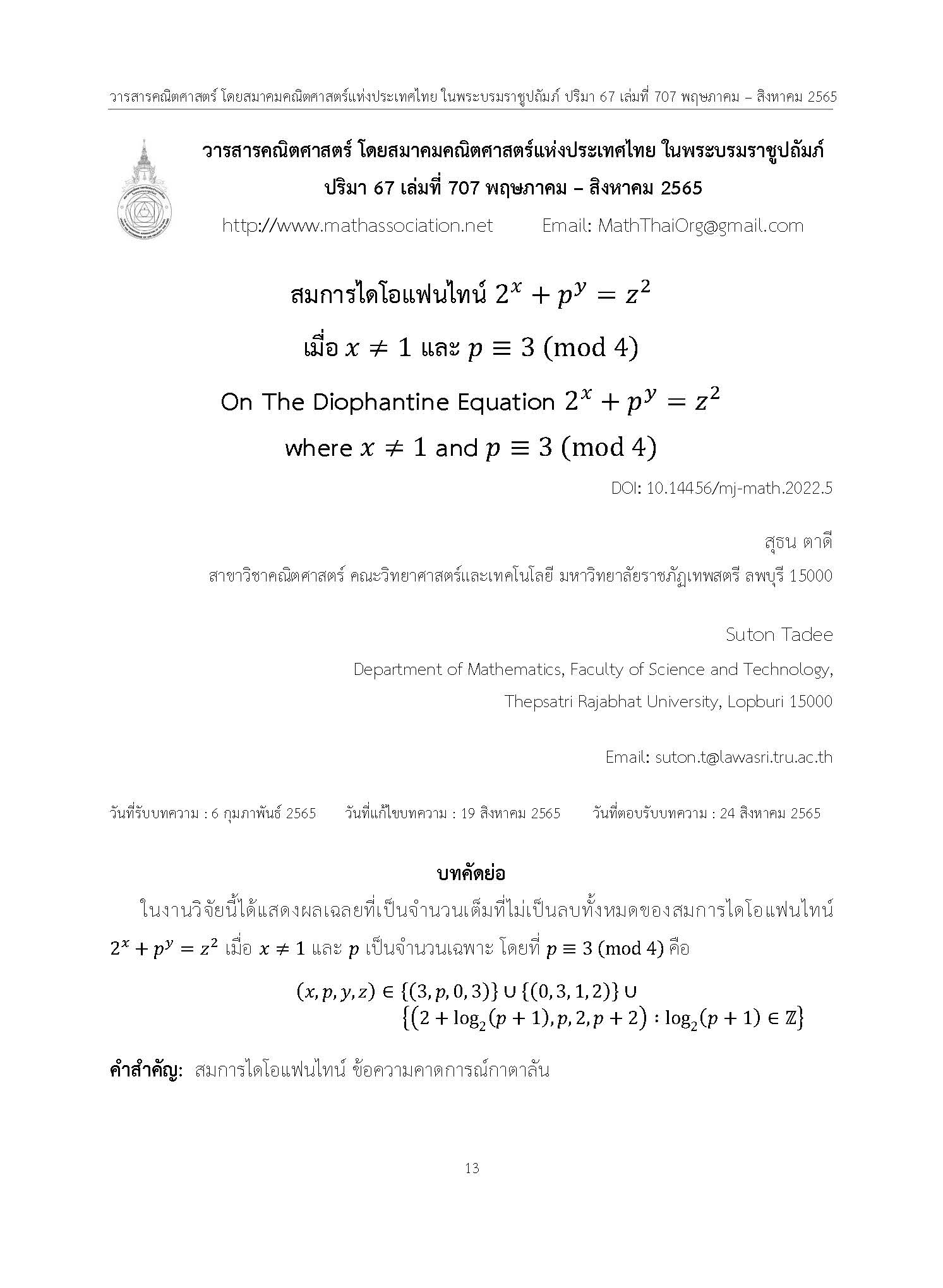On The Diophantine Equation 2^x + p^y = z^2 where x ≠ 1 and p ≡ 3 (mod 4)
Main Article Content
Abstract
In this paper, we show that all non-negative integer solutions of the Diophantine equation , where
is prime and
, are
Article Details
References
Acu, D. (2007). On A Diophantine Equation 2^x + 5^y = z^2. General Mathematics, 15 (4), p. 145 – 148.
Burshtein, N. (2018). All The Solutions to An Open Problem of S. Chotchaisthit on The Diophantine Equation 2^x + p^y = z^2 when p are Particular Primes and y = 1. Annals of Pure and Applied Mathematics, 16 (1), p. 31 – 35.
Chotchaisthit, S. (2012). On The Diophantine Equation 4^x + p^y = z^2 where p is a Prime Number. American Journal of Mathematics and Sciences, 1 (1), p. 191 – 193.
Chotchaisthit, S. (2013). On The Diophantine Equation 2^x + 11^y = z^2. Maejo International Journal of Science and Technology, 7 (2), p. 291 – 293.
Khan, M., Rashid, A. and Uddin, M .S. (2016). Non-Negative Integer Solutions of Two Diophantine Equations 2^x + 9^y = z^2 and 5^x + 9^y = z^2. Journal of Applied Mathematics and Physics, 4, p. 762 – 765.
Mihailescu, P. (2004). Primary Cyclotomic Units and A Proof of Catalan’s Conjecture. Journal für die Reine und Angewandte Mathematik, 572, p. 167 – 195.
Puangjumpa, P. (2016). Possible Solution of the Diophantine Equation 2^x + 47^y = z^2. Academic Journal URU, 11 (3) (special), p. 36 – 42.
Qi, L. and Li, X. (2015). The Diophantine Equation 8^x + p^y = z^2. The Scientific World Journal, 2015, Article ID 306590, 3 pages.
Rabago, J. F. T. (2013). On An Open Problem by B. Sroysang. Konuralp Journal of Mathematics, 1 (2), p. 30 – 32.
Rabago, J. F. T. (2016). On The Diophantine Equation 2^x + 17^y = z^2. Journal of The Indonesian Mathematical Society, 22 (2), p. 85 – 88.
Sroysang, B. (2013). More on The Diophantine Equation 2^x + 3^y = z^2. International Journal of Pure and Applied Mathematics, 84 (2), p. 133 – 137.
Sroysang, B. (2014). On The Diophantine Equation 8^x + 13^y = z^2. International Journal of Pure and Applied Mathematics, 90 (1), p. 69 – 72.
Suvarnamani, A., Singta, A. and Chotchaisthit, S. (2011). On Two Diophantine Equations 4^x + 7^y = z^2 and 4^x + 11^y = z^2. Science and Technology RMUTT Journal, 1 (1), p. 25 – 28.
Tanakan, S. (2014). On The Diophantine Equation 19^x + 2^y = z^2. International Journal of Contemporary Mathematical Sciences, 9 (4), p. 159 – 162.


